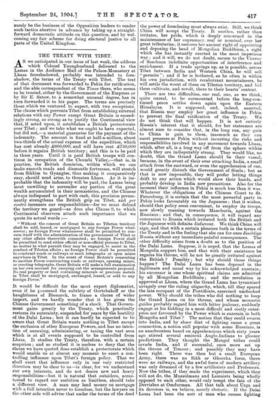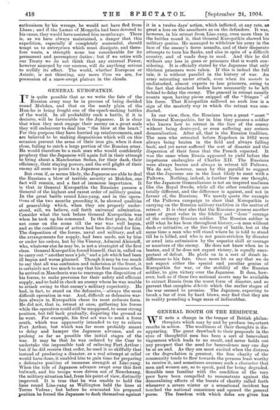A S we anticipated in our issue of last week, the
address 'which Colonel Younghusband delivered to the Lamas in the Audience Hall of the Palace-Monastery at Lhasa foreshadowed, probably was intended to fore- shadow, the terms of the Treaty with Tibet. The text of that document was forwarded to Pekin for ratification, and the able correspondent of the Times there, who seems to be trusted, either by the Government of the Empress or by Sir E. Satow, to a somewhat unusual degree, has in ;turn forwarded it to his paper. The terms are precisely those which we ventured to expect, with two exceptions. The clause which prevents Tibet from establishing external relations with any Power except Great Britain is exceed- ingly strong, so strong as to justify the Continental view that, if acted upon, it establishes a British protectorate over Tibet ; and we take what we ought to have expected, tut did not,—a material guarantee for the payment of the indemnity. The amount is fixed at half-a-million, about two-thirds of the actual expense of the expedition, which has cost already £600,000, and will have cost £750,000 before it regains British territory ; and this is to be paid in three years. Until it is paid British troops will con- tinue in occupation of the Chumbi Valley,—that is, in practice, the British dominion, within which we can make smooth roads and dismantle fortresses, will stretch from Sikkim to Gyangtse, thus making it comparatively easy, should need arise, to threaten Lhasa. As it is im- probable that the indemnity will be paid, the Lamas being most unwilling to surrender any portion of the great wealth accumulated in their monasteries, and the Chinese always indisposed to part with cash, this provision perma- nently strengthens the British grip on Tibet, and per contra increases our responsibilities—for we must defend the territory we guard—as does also Clause 9, to which Continental observers attach such importance that we quote its actual words :— " Without the consent of Great Britain no Tibetan territory shall be sold, leased, or mortgaged to any foreign Power what- soever; no foreign Power whatsoever shall be permitted to con- cern itself with the administration of the government of Tibet or any other affairs therewith connected ; no foreign Power shall be permitted to send either official or non-official persons to Tibet, no matter in what pursuit they may be engaged, to assist in the conduct of Tibetan affairs ; no foreign Power shall be permitted to construct roads or railways or erect telegraphs or open mines anywhere in Tibet. In the event of Great Britain's consenting to another Power constructing roads or railways, opening mines, or erecting telegraphs, Great Britain will make a full examination on her own account for carrying out the arrangements proposed. No real property or land containing minerals or precious metals in Tibet shall be mortgaged, exchanged, leased, or sold to any foreign Power."
It would be difficult for the most expert diplomatist, even if he possessed the subtlety of Gortchakoff or the haughtiness of Bismarck, to frame a clause of wider import, and we hardly wonder that it has given the Chinese Government something of a shock. That Govern- ment gains greatly by the Treaty, which practically restores its suzerainty, suspended for years by the hostility of. the Dalai Lama ; but it can hardly be expected to be aware that Great Britain wants nothing in Tibet except the exclusion of other European Powers, and has no inten- tion of annexing, administering, or taxing the vast area which is at all events supposed to be controlled from Lhasa. It studies the Treaty, therefore, with a certain suspicion ; and so studied it is useless to deny that the clause we have quoted does establish a protectorate which would enable us at almost any moment to exert a con- trolling influence upon Tibet's foreign policy. That we shall exert that influence only in one very restricted direction may be clear to us—is clear, for we understand (Sur own interests, and do not desire new and heavy responsibilities—but it is natural that outsiders, accus- tomed to regard our ambition as limitless, should take 4- different view. A man may lend money on mortgage with a full intention never to foreclose, but the lawyers on the other side will advise that under the terms of the deed the power of foreclosing must always exist. Still, we think China will accept the Treaty. It soothes, rather than irritates, her pride, which is deeply concerned in the maintenance of her supremacy, real or nominal, over her great tributaries; it restores her ancient right of appointing and deposing the head of Mongolian Buddhism, a right which she has instantly exerted in the most imperious way ; and it will, we do not doubt, secure to the Viceroy of Szechuan indefinite opportunities of interference and enrichment. If a trade springs up, as is possible, across Tibet between India and Western China, he will sell " permits "; and if he is bothered, as he often is within his own jurisdiction, with recalcitrant mountaineers, he will settle the worst of them on Tibetan territory, and bid them cultivate, and revolt, there to their hearts' content.
There are two difficulties, one real, one, as we think, quite unreal, to be surmounted before the long-con- tinued peace settles down again upon the Eastern Himalayas. It is supposed, and, indeed, asserted, that Russia may employ her great influence in Pekin to prevent the final ratification of the Treaty. We do not think that will happen. It is not entirely Russia's interest that it should, for her statesmen are almost sure to consider that, in the long run, any gain to China is gain to them, inasmuch as they can exert pressure at Pekin without incurring the risks and responsibilities involved in any movement towards Lhasa, which, after all, is a long way off from the sphere within which they are indisputably strong. They would like, no doubt, that the Grand Lama should be their vassal. because, in the event of their ever attacking India, a small attack from the eastward, or even the apprehension of one, would greatly disturb the Government of Simla; but as that is now impossible, they will prefer letting things drift to any action which would show their hands, and probably develop in India new precautions. Also for the moment their influence in Pekin is much less than it was. Whatever the obligations of the Chinese Court to St. Petersburg, it is certain that the most powerful party in Pekin looks favourably on the Japanese ; that it wishes, should that policy seem convenient, to employ its troops, now slowly massing towards Manchuria, against the Russians ; and that, in consequence, it will regard any concession to Russia which irritated both the British and the Japanese with definite disfavour. We think China will sign, and that with a certain pleasure both in the terms of the Treaty and in the feeling that she can for once disoblige Russia without any immediate painful consequences. The other difficulty arises from a doubt as to the position of the Dalai Lama. Suppose, it is urged, that the Lamas of Mongolia support him, and that with their assistance he regains his throne, will he not be greatly irritated against the British Possibly ; but why should those things happen ? The Dalai Lama has been deposed in the legitimate and usual way by his acknowledged suzerain ; his successor is one whose spiritual claims are admitted by all Mongolian Buddhists ; and the revolution is approved at Lhasa, where the Grand Lama has tyrannised. savagely over the ruling oligarchy, which, till they spared the late occupant of the Pontificate, exercised unchecked power. Why should the tribes who did nothing to keep the Grand Lama on his throne, and whose monastic guides probably regard him with bitter jealousy, suddenly engage at his bidding in a most difficult and costly enter- prise not favoured by the Power which is suzerain in both Mongolia and Tibet ? The notion that they could swarm into India, and by sheer dint of fighting cause a great commotion, a notion still popular with some Russians, is an anachronism based on apprehensions which sixty years ago stirred several eminent Anglo-Indians to gloomy predictions. They thought the Mongol tribes could invade India, and if successful, once more set up the throne of Timour ; and possibly they may have been right. There was then but a small European Army, there was no Sikh or Ghoorka force, there were no railways, and the awful force of modern artillery was only dreamed of by a few artillerists and Professors. Now the tribes, if they made the experiment, which they will not do, the Mussulmans and Lamaists being wholly opposed to each other, would only tempt the fate of the Dervishes at Omdurman. All that talk about Ilrga and its devotees is, we believe, merely rhetoric. If the Dalai Lama had been the sort of man who rouses fighting enthusiasm by his wrongs, he would not have fled from Lhasa; and, if the Lamas of Mongolia had been devoted to his cause, they would have assisted him months ago. There is, as we have always maintained, a danger that this expedition, especially if completely successful, should tempt us to enterprises which must dissipate, and there- fore waste, a strength none too considerable for its permanent and peremptory duties ; but if we retire with our Treaty we do not think that any external Power, however annoyed by our success, will do anything serious to nullify its effect. The world, whether European or Asiatic, is not thirsting, any more than we are, for possession of a snow-swept plateau in the clouds.







































 Previous page
Previous page